A Sixth Part of the World is a russe film of genre Documentary directed by Dziga Vertov
A Sixth Part of the World (1926)
Шестая часть мира

If you like this film, let us know!
A Sixth Part of the World (Russian: Шестая часть мира, Shestaya Chast Mira), sometimes referred to as The Sixth Part of the World, is a 1926 silent film directed by Dziga Vertov and produced by Kultkino (part of Sovkino). Through the travelogue format, it depicted the multitude of Soviet peoples in remote areas of USSR and detailed the entirety of the wealth of the Soviet land. Focusing on cultural and economic diversity, the film is in fact a call for unification in order to build a "complete socialist society". A mix between newsreel and found footage, Vertov edited sequences filmed by eight teams of kinoks (kinoki) during their trips. According to Vertov, the film anticipates the coming of sound films by using a constant "word-radio-theme" in the intertitles. Thanks to A Sixth Part of the World and his following feature The Eleventh Year (1928), Vertov matures his style in which he will excel in his most famous film Man with a Movie Camera (1929).
Synopsis
Vertov starts by showing us, with intertitles in giant Cyrillic characters, what he sees (Вижу) about the capitalist West with its foxtrot and black minstrels, and then switches his attention to the audience (Вы) and then the individual viewer (Ты). In one self-reflexive moment, Vertov even shows cinema-goers watching an earlier piece of the film (‘And you sitting in the audience’). He takes us on a tour of the vital importance of agricultural production, which generates export revenue (shot of the ship’s nameplate ‘Greenwich’) so that Russia can buy machines to build more machines (shots of a milling machine). This gives him the pretext to take us on a Cook’s tour of the extremities of the Soviet Union: we see the icebreaker Lenin (amazing shot downwards from above the prow) delivering new dogs to the Samoyeds on Novaya Zemlya, and their being invited on board to listen to a gramophone recording of the great man himself. We go to Bukhara where one of the mosques is looking very dingy and crumbled, and to Leningrad where the trams run down the middle of broad empty boulevard as a horse-drawn carriage turns out. We see a Kirghiz with a giant eagle perched on his arm, a bear encircled by yapping dogs, a fox caught in a trap and another one that is a child’s pet, guillemots, gulls, a man shooting a sable in the top of a pine tree, a pine marten, sheep being dragged into the sea for a wash and other sheep being obliged to jump into a stream for the same purpose - the intertitles are surreal: (“You – whether you are washing your sheep in the sea (film) or whether you are washing your sheep in the river (film)…”, We see trappers bringing their furs to the Госторг (Gostorg) trading post in exchange for manufactured goods, everyone contributing to the national economy. Ironically, the furs are destined for the Leipzig fair (ярмаркт). In an amazing stop-frame sequence, rows of oranges align themselves in a packing box, wadges of packing material shuffle along and jump on top of them, and then the lids close (you can just see the line pulling one of the sides). We see coke being quenched also, as well as electricity pylons and insulators, and the village electricity co-op. We see sturgeon being hoiked out of tanks to make caviar. We see barrels of butter – 'it is yours!' We see wheat being threshed, linen being spun and cotton being ginned. We see the country being modernised, although there are still some people who trust in Mohammed (film) or Christ (a man telling his rosary) or Buddha (film) and we are shown a Siberian shaman looking remarkably like a North American Indian, and even a reindeer being slaughtered (by axe blows to the neck) as a sacrifice. We see crowds of women in full-face veils, but also a modernising country as a woman lifts her veil. And we see some tundra-dwellers eating raw reindeer meat.Comments
Leave comment :
Suggestions of similar film to A Sixth Part of the World
There are 5 films with the same director, 8866 with the same cinematographic genres, 7854 films with the same themes (including 1230 films with the same 2 themes than A Sixth Part of the World), to have finally 70 suggestions of similar films.If you liked A Sixth Part of the World, you will probably like those similar films :
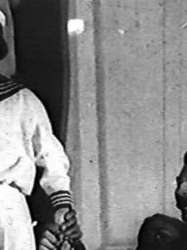
Lullaby (1937)
Directed by Dziga Vertov
Genres Documentary
Themes Documentary films about politics, Political films
Rating67%






Directed by Dziga Vertov
Genres Documentary
Themes Documentary films about politics, Political films
Rating56%






Man with a Movie Camera (1929)
, 1h20Directed by Dziga Vertov
Origin Russie
Genres Drama, Documentary
Themes Films about films
Actors Mikhail Kaufman
Rating82%





Une journée de la vie quotidienne à Odessa: un opérateur filme, une monteuse visionne ses images, des spectateurs regardent le film qui est fait.
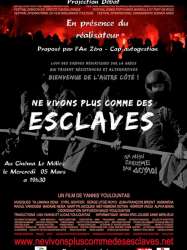
Let's Not Live Like Slaves (2013)
, 1h29Origin France
Genres Documentary
Themes Films about slavery, Films about anarchism, La mondialisation, Philosophie, Politique, Documentary films about politics, Documentary films about anarchism, Political films
Rating70%





Ce film a pour titre un slogan qui a fait le tour de la Grèce en crise depuis 2010 et qui commence à voyager au-delà : « Ne vivons plus comme des esclaves », qui se prononce « Na min zisoumé san douli » en grec. Un slogan qu'on peut lire en Grèce sur les murs des villes et sur les rochers des campagnes, sur les panneaux publicitaires vides ou détournés, dans les journaux alternatifs et qu'on peut entendre sur certaines stations de radio et dans les lieux d’autogestion qui se multiplient. Un slogan diffusé jour après jour, et que les intervenants grecs du film invitent les spectateurs à reprendre en chœur, sur les mélodies du film réalisé en coopération avec eux.

Radosław (2013)
Origin Pologne
Genres Biography, Documentary
Themes Politique, Political films
Le film est consacré à l'Insurrection de Varsovie de 1944 et retrace les actions menées par le lieutenant-colonel Jan Mazurkiewciz, nom de guerre "Radosław", et de son groupe du même-nom le Groupe Radosław (polonais : Grupa Radosław) durant les soixante-trois jours que dura l'Insurrection.
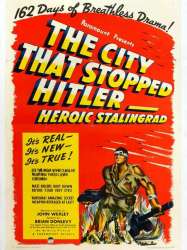
Stalingrad (1943)
Genres War, Documentary
Themes Politique, Political films
Actors Brian Donlevy
Rating74%






Duck and Cover (1952)
, 9minutesOrigin USA
Genres Documentary, Historical, Animation
Themes Films about animals, Medical-themed films, Politique, Films about drugs, Documentary films about law, Documentary films about health care, Mise en scène d'une tortue, Political films, Reptile
Actors Robert Middleton
Rating59%





thumbtime=47 The film starts with an animated sequence, showing an anthropomorphic turtle walking down a road, while picking up a flower and smelling it. A chorus sings the Duck and Cover theme:
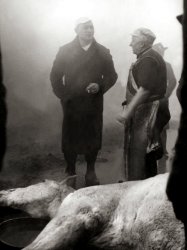
Blood of the Beasts (1949)
, 21minutesDirected by Georges Franju
Origin France
Genres Documentary, Horror
Themes Films about animals, Environmental films, Politique, Films about the labor movement, Documentary films about animal rights, Documentaire animalier, Documentary films about law, Documentary films about environmental issues, Documentaire sur le monde du travail, Political films, Documentary films about nature
Actors Georges Hubert, Nicole Ladmiral
Rating76%





Franju's film contrasts peaceful scenes of Parisian suburbia with scenes from a slaughterhouse. The film documents the slaughtering and butchering of horses, cattle, and sheep. The film is narrated without emotive language.
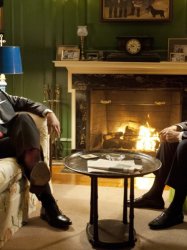 , 1h37
, 1h37Directed by Stephen Frears
Origin USA
Genres Drama, Biography, Documentary
Themes Politique, Sports films, Martial arts films, Boxing films, Political films, Le boxe anglaise
Actors Christopher Plummer, Danny Glover, Frank Langella, Ed Begley Jr., Barry Levinson, Pablo Schreiber
Rating66%





Le procès pour objection de conscience du boxeur Mohamed Ali jusqu'à la Cour suprême.
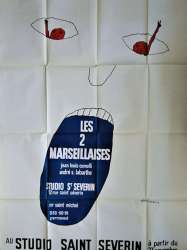
Les deux marseillaises (1968)
, 1h50Directed by André S. Labarthe, Jean-Louis Comolli
Origin France
Genres Documentary
Themes Politique, Documentary films about politics, Political films
Actors Roger Hanin
La campagne des élections législatives de juin 1968 à Asnières avec les trois principaux candidats : Albin Chalandon (UDR), Claude Denis (PCF) et Roger Hanin (FGDS).
 Connection
Connection